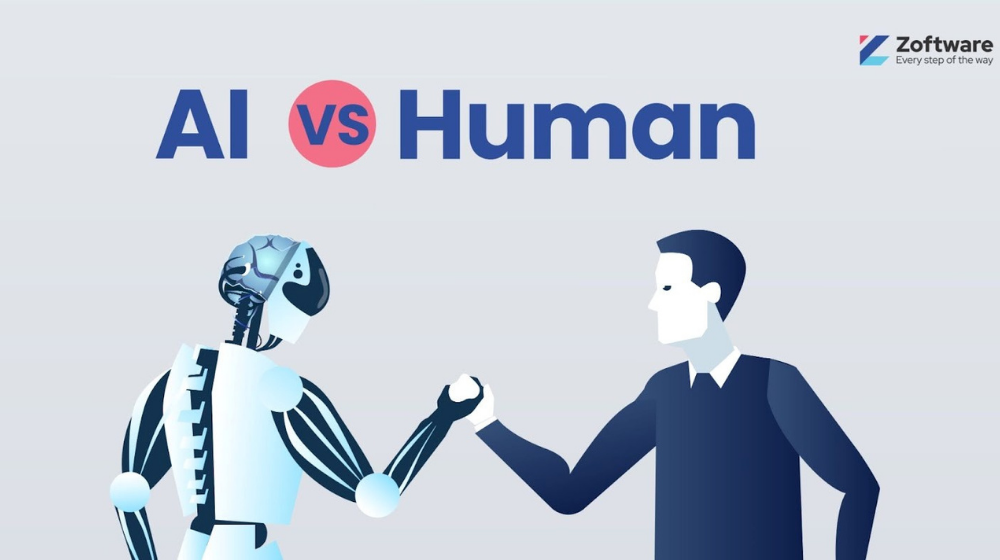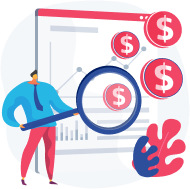Can AI write better than humans?
The real problem is not who writes better but whether Artificial Intelligence will replace human writers. You know even AI is capable of giving strong competition to doctors?
Since the popularity of Artificial Intelligence content has increased, the fear of being replaced by it has also increased. Undoubtedly, artificial intelligence works way better and faster than humans, but it remains a question to ask whether it will replace humans.
Well, humans do have some strength against Artificial Intelligence and vice versa. So, let’s jump into this blog to find out whether artificial intelligence can replace humans.
Get your answers here!
Artificial Intelligence vs. Humans: Strengths & Weaknesses
In this ever-evolving technology industry and the presence of artificial intelligence in our lives, the debate between artificial intelligence and human intelligence is always raging. Both possess different sets of strengths and weaknesses to look into.
AI’s strengths:
- Speed: One of AI’s most powerful advantages is its processing speed. With the help of writing bots, it can analyze vast amounts of data, make calculations, and provide results in seconds. Based on the results and data, it can make future predictions. And here, a human can take an eternity to accomplish.
- Efficiency: Artificial Intelligence systems perform repetitive tasks with high accuracy and less time. This efficiency ensures consistent and error-free execution, especially in manufacturing and data analysis industries.
- Data-driven analysis: AI’s ability to understand numbers and detect patterns in massive datasets is unparalleled. This data-driven approach aids in decision-making. It can be from predicting market trends to diagnosing medical conditions.
- Consistency: Artificial Intelligence can perform tasks consistently without influence or external hindrance. This leads to error reduction in critical processes.
AI’s weakness:
- Lack of creativity: Even though Artificial Intelligence has effective analytical techniques, the writing bots need to improve in creativity. It feeds on information given by external sources and then works on it. For instance, AI suits tasks like music generation but still needs an external suggestion to create fantastic music.
- Originality: As said above, Artificial Intelligence cannot produce original content. Existing data and algorithms bind it.
- Emotional intelligence: Artificial Intelligence lacks emotional intelligence. The writing bots may write content but need help understanding human emotions or the subtleties of human interaction, making them less effective in roles that require empathy, such as counseling or customer service.
- Difficulty in capturing brand voice: Artificial Intelligence often finds capturing a specific voice challenging. While it can mimic general styles, the nuances and unique tone that define a brand’s identity can be elusive for Artificial Intelligence systems.
Human strengths:
- Originality: Humans excel in creativity, bringing fresh perspectives, ideas, and innovations to the table. This trait is precious in creative industries, research, and problem-solving. Take the example of the previous music generation; humans can perform the same music generation without any external source. They can think and create an original piece of music.
- Empathy: Human beings possess a deep well of emotional intelligence, allowing them to connect with others on a profound level, understand their needs, and provide support and empathy.
- Critical thinking: The ability to analyze complex situations, consider multiple perspectives, and make informed decisions is a core human strength that underpins problem-solving and strategic thinking.
- Understanding context and nuance: Humans effortlessly interpret context and nuances in communication, helping them navigate social interactions and make informed judgments.
Human Weaknesses:
- Time constraint: Despite these strengths, humans have their vulnerabilities. Time constraints are a significant limitation. Humans cannot work at the speed of Artificial Intelligence and need rest, leading to slower project completion.
- Susceptibility to Writer’s Block: Humans can experience creative droughts and may inadvertently introduce their biases into their work, affecting objectivity and quality.
Ethical Considerations – Making Artificial Intelligence Fair for Everyone
There’s a growing conversation about something significant – ensuring Artificial Intelligence treats everyone fairly. You see, sometimes Artificial Intelligence can be biased, meaning it might unintentionally favor one group of people over another. This can happen because Artificial Intelligence is learning from data that isn’t quite right – maybe it only represents one type of person, or it’s based on old ideas that we no longer agree with.
This bias in Artificial Intelligence is a big deal because Artificial Intelligence is used for many things, like deciding who gets a job interview, how we get medical treatment, or even how safe our neighborhoods are.
Where Does Bias in Artificial Intelligence Come From?
Imagine Artificial Intelligence as a student who learns from books filled with information from the past. If those books have wrong or unfair ideas, the student will learn them too. In AI, these ‘books’ are the data we feed it. If this data only shows one side of the story, the AI’s decisions might be unfair to those not represented.
How Can We Make Artificial Intelligence More Fair?
- Learning from Everyone: It’s like inviting everyone to the table. We must ensure that Artificial Intelligence learns from a mix of people from all walks of life. This way, it can understand and serve everyone better.
- Checking AI’s Homework: Regularly checking what Artificial Intelligence is doing helps us catch any unfairness. It’s like making sure it’s still on the right track.
- Straightforward Recipes for AI: Understanding how Artificial Intelligence makes its decisions is like reading a recipe. If we know what’s happening, we can ensure it suits everyone.
- Teamwork Makes the Dream Work: Having people from different backgrounds – like teachers, scientists, and artists – work on Artificial Intelligence can help spot and fix biases that others might miss.
- Learning to Do Better: Teaching everyone who makes and uses Artificial Intelligence about fairness helps them think more about how their work affects everyone.
- Listening to the People: Talking to people affected by Artificial Intelligence helps us understand what’s fair and what’s not. It’s like getting feedback to improve.
- Rules and Guidelines: Having rules about making Artificial Intelligence fair is like having traffic lights. They guide everyone to do the right thing.
Job Displacement Due to Artificial Intelligence Content Creation
Another raging debate has continued since Artificial Intelligence content started taking over the market. People like content writers and copywriters are worried. Not only people engaged in content creation but also people working in places like call centers are concerned about it.
Here are some of their reasons to get worried:
- Skill Redundancy: AI’s proficiency in generating content could make specific skill sets obsolete. Traditional roles in writing and editing face reduction, as Artificial Intelligence can produce similar outputs more efficiently. This shift demands a workforce adept in Artificial Intelligence management rather than conventional content creation.
- Industry Concentration: Artificial Intelligence content creation centralizes job opportunities in tech-centric sectors, marginalizing non-tech industries. This concentration risks creating an employment imbalance. Workers in creative fields may find fewer openings, compelling a career pivot towards technology, which may only be feasible or desirable for some.
- Economic Impact: The rise of Artificial Intelligence in content creation could lead to a significant economic shift. As Artificial Intelligence takes over routine writing tasks, there might be a decrease in job diversity. This reduction could affect the broader economy, as decreased spending power among displaced workers impacts various sectors.
- Societal Shifts: Adopting Artificial Intelligence in content production can lead to broader societal changes. Workers displaced from traditional content creation roles may need help finding equivalent positions, potentially leading to increased unemployment rates. This shift challenges the social fabric, necessitating new workforce adaptation and support strategies.
Transparency and the Importance of Disclosing AI-Generated Content
Let’s delve into why transparency about AI’s role in content generation is not just good practice but a cornerstone of digital trust and integrity.
- Honesty is Key: Using Artificial Intelligence to create content is like having an invisible helper. It’s important to let our audience know about this helper. This way, we’re honest with them, showing that we value trust in our digital conversations.
- Celebrating Human Touch: Sometimes, Artificial Intelligence helps us out, but there’s still a human behind the work. It’s important to tell our audience what was made by human hands and what was assisted by AI. This gives credit where it’s due and keeps the human spirit alive in our creations.
- Keeping It Real: We might accidentally mislead people if we don’t say when Artificial Intelligence is involved. By being open about when Artificial Intelligence is used, we keep our stories genuine and ensure that we’re not mixing up real human experiences with something a computer has made up.
- A Matter of Respect: Using Artificial Intelligence responsibly means we respect our audience. By being transparent about using AI, we’re not just being honest; we’re also showing that we care about our audience’s right to know where their information comes from. It’s about building a trustworthy space in the digital world.
Practical Tips for Content Creators
- Choosing Artificial Intelligence Tools That Suit You Best: Consider what you need from Artificial Intelligence Tools. Look for ones that are easy to use, flexible, and let you tweak things your way. It’s like picking a good kitchen gadget – it should make your work easier without taking over the cooking.
- Making Artificial Intelligence a Helpful Companion, Not a Boss: Artificial Intelligence is a bit like an intelligent assistant – it can give you great ideas and help with the heavy lifting, but you’re still in charge. Make sure your final content sounds like you, not a robot.
- Keeping Your Content Warm and Personal: People connect with people, not machines. Sprinkle your stories, opinions, and personal flair into your content. These human touches make your work stand out and resonate with others.
- Finding the Sweet Spot Between Fast and Fantastic: Artificial Intelligence can speed things up, but don’t rush the magic. Take time to dream and doodle – Artificial Intelligence is there to polish your ideas, not to rush them out the door. Think of it as having an extra pair of hands, not a speed race.
Conclusion
Well, we may never be able to decide whether Artificial Intelligence is better or human, or things may change. Artificial Intelligence is taking the market now, but human writers are still in the race. They both fulfill each other’s strengths and weaknesses.
In today’s world, many Artificial Intelligence tools are tailored to meet specific needs, but finding the appropriate Artificial Intelligence Technologies for your industry can be daunting. It thoroughly analyzes each tool to determine the best fit for your requirements.
But there’s good news! Zoftware is here to help.
Based in the Middle East, Zoftware serves as a discovery platform for software, with a primary focus on helping businesses navigate the complex task of selecting the right software and tools. Zoftware aids organizations in identifying their unique needs and comparing various software options, enabling a more informed and accurate decision-making process.
Register today at Zoftware to discover the ideal software solution for your business.

